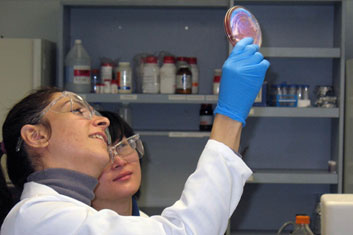
- Home
- Chemistry Materials Topics
- Biology and Chemistry Materials
- Electro Chemistry Materials
- Engineering Chemistry Materials
- Food Chemistry Materials
- Nanoscale Chemistry Materials
- Physics and Chemistry Materials
- Quantum Mechanics Chemistry Materials
- Resonance Chemistry Articles
- Synthesis Chemistry Materials
Engineering Chemistry Materials
Materials science is defined, in its most basic application, as the study of matter and its relation and practical adaptation to other fields of science; in regards to Chemical Engineering, as Nobel Prize winner Japanese engineer Koichi Tanaka puts it, it can be simply defined as applying chemistry to everyday life. From this, we can now understand what Engineering Chemistry Materials is, which is combining the science of chemistry and the knowledge gained from the properties of matter, and producing or converting this to a more practical form that can help make life easier.
Applying Engineering Chemistry Materials
Engineering Chemistry Materials is a branch of science that deals not only with chemistry, but with other branches of science as well, such as (not limited to):
- Physics
- Biology
- Zoology
- Geology
Engineering Chemistry Materials involves the study of matter, its basic components, properties, atoms and molecules and how these properties react to other matter or elements. It’s also necessary to research the different results that are produced when the different chemicals are combinedand how these products can be of use in today’s numerous industries. It may not be evident tothe average person, but ordinary items that can be easily obtained today, such as soap and toothpaste, were developed by applying Engineering Chemistry Materials.
Classifying Engineering Chemistry Materials
Engineering Chemistry Materials can be classified according to the materials used in building the different variety of products, and each classification is based on the chemical and atomic properties – how they react and bond together. The classifications of engineering chemistry materials and the different categories are as follows:
- Ceramics and Glasses – You might see ceramics and glasses as more on the decorative side, such as ceramic vases and plates and vanity mirrors, but they have also been used to make heavy machinery.
- Metals – For the average person, a metal is just a metal, but in reality, the metals that you see every day differ from one another due to the way they were molded and melted along with other materials. Stainless steel and copper alloys are both metal but have a different composition and properties; hence their applications are completely different.
- Biomaterials – Any type of engineering chemistry materialthat is involved with or interacts with living systems (e.g. pacemaker).
- Semiconductors – These are the materials that are used mostly in electronics. These engineering chemistry materials are used because of their ability to conduct, store or resist electricity.
- Polymers – Normally, polymers refer to synthetics and plastics; they were produced by re-arranging the molecular structural units of a few specific elements. With time, these engineering chemistry materials became a critical part of all plastic production.
Understanding Engineering Chemistry Materials
Engineering chemistry materials may sound daunting and too scientific to the common people, but it has been part of the evolution of modern man.From the simple process of wine-making in ancient Greece to the old tradition of Brazilian Indians of extracting poison, engineering chemistry materials have come to stay. Even if the processes are not readily visible, they are certainly changing the way people live today, especially because of the advantages that originate from using engineering chemistry materials.
